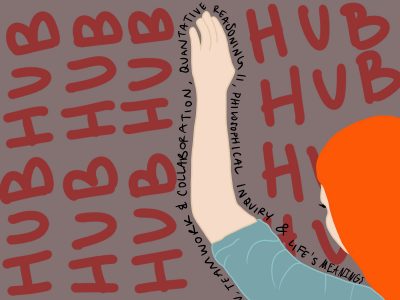Boston University’s Hub has been around for almost three years now, but for some of us, it has defined our entire college careers.
At first glance, the Hub seems reasonable: a way to ensure students are well-rounded by the time they enter the workforce. Without the liberal-arts-esque format to encourage interdisciplinary learning, it may be too easy to become hyper-focused on one subject or major.
Studying different areas also allows students to develop transferable skills and gain important context for the impact of their work in other areas of society. The Hub is meant to provide structure and guidance to this feat and incentivize students to explore areas they may never have considered or enjoyed otherwise.
However, the Hub is severely lacking in its execution.
For one, the entire system is confusing beyond measure: It requires students to not only keep track of their course credits and major requirements, but also Hub units, which are not equivalent to credits.
Furthermore, there are too many required Hub units — 26 in total — and not always enough Hub credit courses to compensate. The designation of Hub units seems to be an overly subjective process as well, given some classes fit the profile yet may not be granted units. For example, Drawing 1, despite being an art class in the College of Fine Arts, doesn’t qualify for Aesthetic Exploration, whereas Foundation Sculpture does.

As a result of this uneven distribution of Hub units, students are limited in their class choices. Often, we find ourselves eyeing an exciting class, only to realize it doesn’t fulfill any necessary Hub requirements. We are then forced to select a less appealing class so as not to “waste” our credits.
Worse, some students are discouraged from pursuing academically stimulating and enriching experiences — such as study abroad programs — in lieu of accommodating the Hub.
In addition, there simply isn’t enough time to complete 26 units when one four-credit class typically only fulfills one or two of those units. For people with dual degrees or minors and less room in their schedules, it can be even more restricting, reducing the number of classes they can choose from to a meager pool of what fulfills both degree requirements and Hub requirements.
Why should we pay more than $58,000 in tuition to be pigeonholed into taking classes that don’t interest us? Interdisciplinary learning is counterproductive if it means forcing students to take classes they won’t enjoy or miss out on classes they are passionate about.
The BU Hub program also doesn’t accept the same skills and knowledge if they are gained from another college, which means transfer students and those who take community college classes will still be required to go out of their way to take similar classes at BU — whether by overloading or paying extra for a summer term.
In short, it puts undue pressure and stress on students, especially upperclassmen who must focus on their majors and concentrations and don’t have the time, energy or need to explore new areas of study. The Hub is currently more of a hindrance to the average student than an advantage.
However, that doesn’t necessarily mean we should eliminate the program altogether. General education and interdisciplinary studies remain crucial, but it may be time to redefine and improve the Hub, which the University could easily do by first halving the required units to 13 and letting students devote fewer course credits to fulfilling them.
Every class should also be assigned a relevant Hub credit to increase the catalog and subsequently reduce the stress of planning schedules and balancing graduation requirements.
Moreover, BU must allow for students to more easily petition and earn Hub units from external college course completion or even internships. As of now, the Hub policies and procedures page states that expectations are “rarely made.”
The pandemic has thrown us all into odd circumstances — some students have not been able to come back on campus and others have taken a leave of absence, supplementing the past year with local college courses — and has shown us there needs to be increased leniency.
And if an experience can teach the same skills and fulfill the same criteria, it should be eligible to count toward the Hub.
There are more ways to be interdisciplinary than through the classes you pay thousands of dollars for: internships, jobs, volunteer opportunities, extracurricular activities and clubs. BU has begun implementing co-curriculars for the Hub, which don’t require any credits for enrollment, but are still under rigid structure and supervision from the University and only able to fulfill one unit total.
Another solution to the Hub issue could be making the general education component a minor requirement rather than an assortment of classes under vague labels — students may naturally gravitate toward a minor that’s outside their major’s field of study to balance out their course load.
College students are adults and should be given the freedom to build more personalized and effective interdisciplinary pathways. Whether it be reducing the Hub, replacing it with a minor requirement or simply adapting it to be more inclusive of other life experiences, the University must re-evaluate its general education program.











































































































